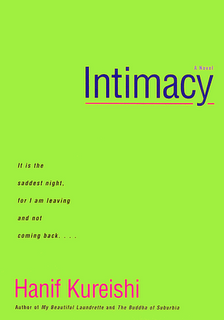 Novel’s title: Intimacy
Novel’s title: IntimacyAuthor’s name: Hanif Kureishi
Author’s nationality: Pakistani-British
Grade: 4
IT IS THE SADDEST NIGHT, FOR I AM LEAVING AND NOT COMING BACK... (Front cover of this novel)
Some days ago I finished reading Intimacy. I had to read it twice and in a very careful way (at least all I could do). There were many fragments in which I really felt sensations, thought of personal ideas. There were many touchy things. It was a very revealing piece of literature revealing an essential piece of life.
The structure of this novel is very steady; it doesn’t change while the story goes. The “rhyme”, the voice, the “bricks” of Intimacy keep themselves unchangeable even though there are some moments of ups and downs. Showing more profound feelings, showing more crude life but almost in the same “rhyme”. I’m not sure if that’s a mistake or an achievement. It is the same with the attraction. At first Kureishi does an awesome job with the beginning of Intimacy. It is:
It is the saddest night, for I am leaving and not coming back. Tomorrow morning, when the woman I have lived with for six years has gone to work on her bicycle, and our children have been taken to the park with their ball, I will pack some things into a suitcase, slip out of my house hoping that no one will see me, and take the tube to Victor’s place. There, for an unspecified period, I will sleep on the floor in the tiny room he has kindly offered me, next to the kitchen...
I will not be returning to this life. I cannot... (Page 3)
Personally it attracted me immediately. The only thing that I wanted then was start reading it. But as the pages were passing, that attraction was decreasing and, I could say, not existing. And then, in one second, appeared again greatly. It’s a big challenge for a writer to have a piece of writing with the same quality of sequences. Even though the sincere voice that a reader finds in the 118 pages of Intimacy, makes this a novel that nobody should miss.
Hanif Kureishi (born December 5, 1954, in London) studied philosophy at the University of London and began writing plays for the Royal Court when he was twenty-one. Kureishi’ script for My Beautiful Laundrette earned him an Academy Award nomination for best screenplays. He also wrote the screenplays for Sammy and Rosie Get Laid, London Kills Me (which he also directed), and My Son the Fanatic, adapted from the short story in his collection Love in a Blue Time. His novels The Buddha of Suburbia (winner of the Whitbread Prize) and The Black Album have been translated into fifteen languages. He lives in London.
